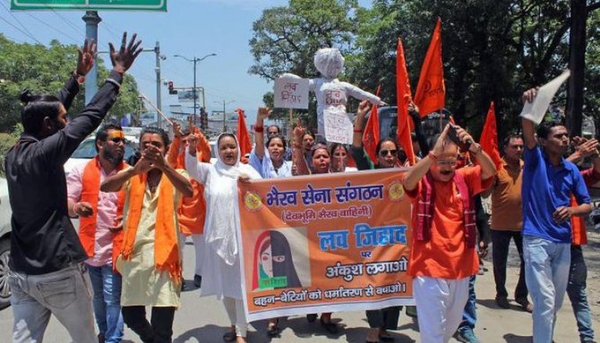SC denies preventing Hindu Mahapanchayat in Uttarkashi
The Uttarakashi district administration on Tuesday denied permission for the mahapanchayat days after posters threatening Muslim traders to shut shops and leave the state by June 15 came up at Purola.
Total Views |
Uttarkashi, Jun 15: The Supreme Court on Wednesday refused an urgent hearing of a petition for preventing a mahapanchayat (assembly of village leaders) many Hindu organizations called on June 15 amid communal tensions in Uttarakhand’s Purola town.

The Uttarakashi district administration on Tuesday denied permission for the mahapanchayat days after posters threatening Muslim traders to shut shops and leave the state by June 15 came up at Purola. The organizers are yet to call it off. Muslim organizations have called their mahapanchayat in Dehradun on June 18.
🚨 Supreme Court refuses to entertain a plea to prevent Hindu Mahapanchayat against R@pe Jih@d to be held in Purola, Uttarakhand. pic.twitter.com/jO2L5CXUhF
— OSINT Updates 🚨 (@OsintUpdates) June 14, 2023
A bench of justices Vikram Nath and Ahsanuddin Amanullah disapproved of “short-circuiting” the judicial process and asked the petitioner to approach the Uttarakhand high court first. “This is an administrative issue. Law-and-order is for the administration to handle. You move the high court first. Why should we hear it directly? The high court is there and it will consider your plea,” the bench told advocate Shahrukh Alam, who sought the urgent hearing of the petition of the Association for Protection of Civil Rights. Alam referred to previous Supreme Court directives for a crackdown on hate speech. “There is a continuing mandamus by this court against hate speech and against the state of Uttarakhand too. They have called for a mahapanchayat saying a particular community has to leave by the 15th of June...There is an ultimatum given to a particular community to leave the place before the mahapanchayat,” Alam said. But the bench remained disinclined. “Why this distrust of the high court? They also have jurisdiction. You should have some trust. They are the first forum of jurisdiction. Have some trust in the high court. Even if we are totally with you, why this short-circuiting?” The bench added that it would be an unfair argument to make that neither the administration nor the high court would act if a complaint was made against hate speech. “Why do you distrust the administration generally? How do you say they won’t act and prohibit the illegal part of it? Isn’t it unfair to distrust them completely? Approach the district administration and the high court,” it told Alam. Alam opted to withdraw the petition from the top court with the liberty to approach the suitable authorities as well as the Uttarakhand high court. The bench allowed her to withdraw the plea with the observation that the petitioners could move the high court or any other authority for relief. As the proceedings drew to a close, Alam submitted that the court may also add in the order that if any untoward incident takes place at the mahapanchayat, the administration would be responsible. But the bench declined. “No, you move the high court...whatever may be your relief, we don’t know.” The tensions in the hill town of Purola were triggered on May 26 after two men, a Muslim, and a Hindu, allegedly tried to abduct a 14-year-old girl. Residents alleged it was a case of love jihad, a term used by right-wing groups to describe an alleged conspiracy by Muslim men to woo and seduce Hindu women, although courts and the Union government did not officially recognize it. The accused Ubed Khan, 24, and Jitender Saini, 23, were arrested on May 27. But right-wing groups held protests in and attacked shops and houses of Muslims. On April 28, a different bench of the Supreme Court directed police chiefs of states and Union territories to file suo motu (on their own) cases against hate speeches. It warned of contempt action if its direction is not complied with.
On that day, the court noted that a similar direction passed in October 2022 for the states of Uttar Pradesh, Uttarakhand, and Delhi was required to be extended to the entire country keeping in view the concerns expressed over rising incidents of hate speeches. The directions were passed while the Supreme Court was hearing pleas relating to incidents of hate speeches across states. In its April 28 order, the court emphasized that hate speech is an “offence affecting the fabric of the nation” and that the court wants criminal prosecution of all those involved in it irrespective of their religion.


